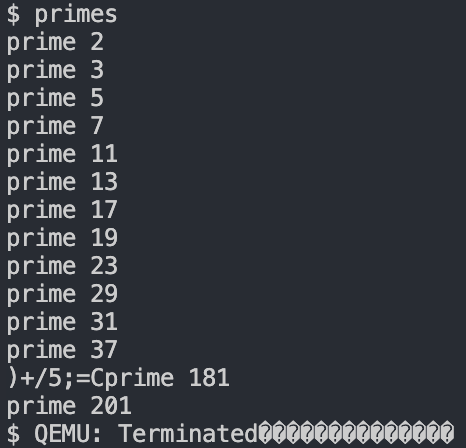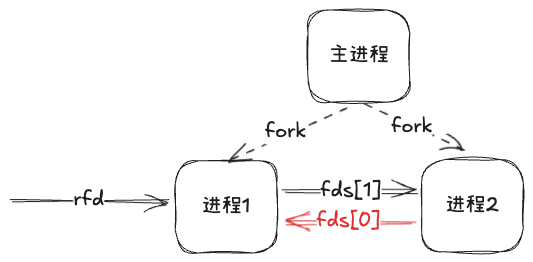xv6 primes
primes
比较容易想到的是递归的做法:主进程生产2~280这些自然数通过管道传输给子进程,子进程读取并将第一个数作为素数输出,剩下的数用该素数作为筛子来筛选,没有被筛除的数就输入管道,输入给下一个子进程,下一个子进程重复上述步骤。
1
2
3
4
5
6
7
8
9
10
11
12
13
14
15
16
17
18
19
20
21
22
23
24
25
26
27
28
29
30
31
32
33
34
35
36
37
38
39
40
41
42
43
44
45
46
47
48
#include "kernel/types.h"
#include "user/user.h"
void sieve(int in_fds[2]) __attribute__((noreturn));
int main(int argc, char *argv[]) {
int fds[2];
pipe(fds);
if (!fork()) {
sieve(fds);
}
close(fds[0]);
for (int i = 2; i <= 280; i++) {
write(fds[1], &i, sizeof(int));
}
close(fds[1]);
wait(0);
exit(0);
}
void sieve(int in_fds[2]) {
close(in_fds[1]);
int p, num;
int fds[2];
// read base
if (!read(in_fds[0], &p, sizeof(int))) {
exit(0);
}
// create next sieve
printf("prime %d\n", p);
pipe(fds);
if (!fork()) {
sieve(fds);
}
// output to next sieve
close(fds[0]);
while (read(in_fds[0], &num, sizeof(int))) {
if (num % p == 0) continue;
write(fds[1], &num, sizeof(int));
}
close(in_fds[0]);
close(fds[1]);
wait(0);
exit(0);
}
但是我这边输出显示乱码:
调试发现是sieve中创建管道的时候失败,进一步发现是将文件描述符消耗完了(xv6中限制文件描述符最大大概为14、15这样)。为什么会消耗完呢:
结合图示,每个进程创建两个文件描述符,关闭其中一个(读管道fds[0]),fork一个新的sieve子进程,开始处理数据,并且只有处理完数据之后才会关闭另一个(写管道fds[1]),当创建新进程的速度大于进程处理数据的速度时,即打开文件的速度大于关闭的速度,迟早会超出文件描述符数量限制,新的进程就无法再创建管道,因此程序跑不下去。
解决方法是用主进程来管理这些管道文件描述符,因为主进程只关注两两进程之间通信使用到的管道,其它管道一律关闭,因此限制了打开文件描述符的数量,具体方式是将递归变更为迭代的方式来创建子进程:
主进程先创建一个生产自然数的进程以及管道,用于生产自然数,其对外暴露一个读管道rfd。随后,主进程创建工作进程以及管道fds,将读管道rfd和写管道fds[1]交给该子进程,子进程从rfd读入数据、筛选数据、数据写入fds[1]。在主进程中将会关闭rfd和fds[1],将fds[0]作为下一个进程的rfd,创建下一个工作子进程….重复上述步骤。
可以看到由主进程来管理文件描述符的话,每次创建子进程时一样会创建一对文件描述符(fds[0]和fds[1]),但是它同时也会关闭一对文件描述符(rfd和fds[1])。这样就不会使得文件描述符超出限制:
1
2
3
4
5
6
7
8
9
10
11
12
13
14
15
16
17
18
19
20
21
22
23
24
25
26
27
28
29
30
31
32
33
34
35
36
37
38
39
40
41
42
43
44
45
46
47
48
49
50
51
#include "kernel/types.h"
#include "user/user.h"
int natural_proc();
int sieve_proc(int rfd, int prime);
int main(int argc, char *argv[]) {
int rfd = natural_proc();
int prime;
while (read(rfd, &prime, sizeof(int))) {
printf("prime %d\n", prime);
rfd = sieve_proc(rfd, prime);
}
exit(0);
}
int natural_proc() {
int fds[2];
pipe(fds);
if (!fork()) {
close(fds[0]);
for (int i = 2; i <= 280; i++) {
write(fds[1], &i, sizeof(int));
}
close(fds[1]);
exit(0);
}
close(fds[1]);
return fds[0];
}
int sieve_proc(int rfd, int prime) {
int fds[2];
int num;
pipe(fds);
if (!fork()) {
close(fds[0]);
while (read(rfd, &num, sizeof(int))) {
if (num % prime != 0) {
write(fds[1], &num, sizeof(int));
}
}
close(fds[1]);
exit(0);
}
close(rfd);
close(fds[1]);
return fds[0];
}
虽然这个代码能通过测试,但我觉得最好还是需要在主进程exit(0)之前加一句while (wait(0) >= 0)来等待所有子进程退出。


